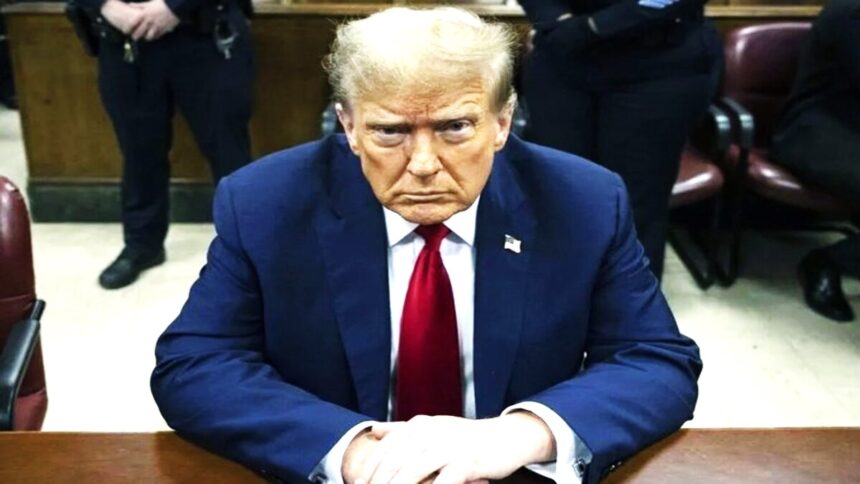Donald Trump is set to face criminal sentencing in a New York court on the eve of his second presidential inauguration, after the U.S. Supreme Court rejected his final bid to delay the proceedings. This decision marks another dramatic twist in a legal saga that has seen the former president embroiled in multiple criminal cases. Despite a rare loss in the high court, Trump’s attorneys plan to continue fighting the charges, further complicating his transition back into the White House.
The Supreme Court’s Decision: A Setback for Trump
On Thursday, the U.S. Supreme Court denied Donald Trump’s request to delay his sentencing in connection with the New York hush money case. The ruling, which came down 5-4, was a rare reversal for Trump’s legal strategy of using appeals to delay legal consequences, especially in the face of criminal charges. In particular, the case concerns Trump’s involvement in paying $130,000 to adult-film actress Stormy Daniels during the 2016 presidential campaign in an effort to silence her allegations of an affair.
With the Supreme Court’s denial, Trump now faces a sentencing hearing scheduled for Friday, January 12—just days before he is set to be sworn in for his second term as president. While Judge Juan Merchan, who presided over the trial, has indicated he will not impose jail time, Trump will still become the first president in U.S. history to enter office with a criminal conviction on his record.
A Historic Moment: President and Defendant
The timing of the sentencing hearing presents an unprecedented scenario: Trump, who will soon hold the highest office in the land, will appear before a judge, subject to the same legal system that holds all citizens accountable. As president-elect, he is set to assume the immense powers of the presidency, but will also remain legally accountable for his past actions. This juxtaposition, with Trump on the cusp of becoming commander-in-chief while still dealing with legal consequences from his past, adds another layer of drama to a presidency marked by legal battles and controversies.
While Trump will not be physically present at the hearing, he is expected to participate virtually from his home in Florida. This marks the beginning of a new chapter in a legal fight that has stretched over many years, with Trump’s legal team continuing to pursue all available avenues to avoid criminal repercussions.
NY Appeals Court has DENIED Trumps Request to halt sentencing in the business fraud case.
Good. This means there will simply be a fine and it'll finally be over.
Dems will all celebrate by labeling him convicted felon, etc. Doesn't Matter.
His second and final presidential… pic.twitter.com/BNwPIYHLmA
— Eric (@FiveHeadClub) January 9, 2025Trump’s Continued Legal Strategy
In the aftermath of the ruling, Trump lashed out against the decision, calling the judge in the case, Juan Merchan, biased and accusing him of seeking to “embarrass” the former president. Trump’s frustration was evident during a recent news conference at his Mar-a-Lago estate, where he complained about the “disgrace” of the legal proceedings, despite his conviction.
Throughout the course of his legal battles, Trump has consistently used a strategy of delaying tactics, hoping that prolonged legal processes might either lead to a favorable ruling or that a change in political circumstances could work in his favor. This strategy has often involved appeals to higher courts, including the Supreme Court, in hopes of stalling proceedings.
In this case, Trump’s legal team had hoped the Supreme Court would grant him a reprieve, allowing him to delay sentencing until after his inauguration. However, in a rare move, two conservative justices, Chief Justice John Roberts and Justice Amy Coney Barrett, joined with the court’s liberal wing to reject his appeal. This decision marks a notable departure from the pattern of deference to Trump’s legal maneuvers seen in previous rulings.
Legal and Political Implications
The timing of this legal drama could have significant political implications as well. Trump, who had long been under investigation for various legal matters, now faces the reality of entering the White House with an official criminal conviction hanging over him. The legal battles don’t end with the hush money case; Trump faces multiple other ongoing investigations and charges, including those related to election interference and the handling of classified documents.
Although some of these cases are still in progress, the decision on his hush money case could further shape Trump’s approach as he takes office once again. The question of how he might use the power of the presidency to influence legal outcomes is a concern that many legal experts, as well as his political opponents, are watching closely.
In the meantime, Trump has not ruled out further appeals. His lawyers continue to challenge various aspects of his legal troubles, and the former president has made it clear that he plans to push forward with appeals related to other charges. This defiance is consistent with Trump’s combative stance toward the legal system, and his supporters are likely to rally behind him, viewing the cases against him as politically motivated.
A Look Ahead: More Legal Challenges on the Horizon
The legal drama surrounding Trump is far from over. Even after the Supreme Court’s decision, he lost another battle when the 11th Circuit Court of Appeals declined to block the release of the Justice Department’s final investigative report into Trump’s alleged role in the January 6th Capitol riots. This decision opened the door for the report to be made public, which could further complicate Trump’s legal challenges in the coming months.
Despite these setbacks, Trump remains a formidable political force. He has already started preparing for his second term, filling key positions in his administration, including selecting two of the lawyers involved in his current legal battles—Todd Blanche and D. John Sauer—to take on major roles in his government. These appointments could raise further questions about the intersection of Trump’s legal issues and his presidential duties.
The Fight Is Far From Over
As Trump faces sentencing in New York, his legal troubles are far from resolved. The implications of this case are wide-ranging, as they not only affect his personal future but also set the stage for a second presidential term marked by controversy, legal battles, and intense political scrutiny. As Trump prepares to take office again, the question remains: How will his legal entanglements influence his ability to govern, and how will they shape his legacy moving forward? Only time will tell.
Read More : Pacific Palisades Faces Devastating Wildfire: A Celebrity Enclave in Crisis






